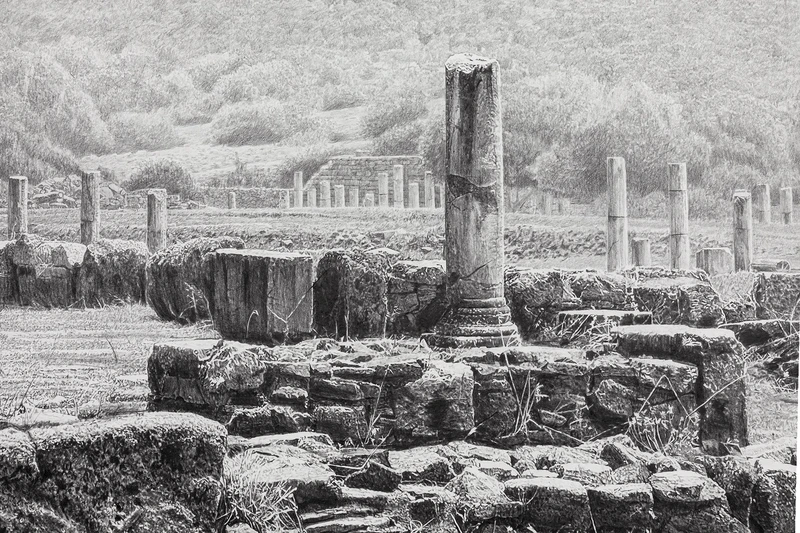Mythology Reinterpreted: A Journey through Ancient Inspiration in Modern & Contemporary Art
8 Oct 2024-24 Jan 2025
PV 8 Oct 2024, 6-8pm


Mazzoleni, London is pleased to present the exhibition Mythology Reinterpreted: A Journey through Ancient Inspiration in Modern & Contemporary Art. Opening on 8 October until 6 December, the exhibition strives to reinterpret the ancient through the lens of Italian artists Giorgio de Chirico, Salvo and Giulio Paolini and Mexican artist Jorge Méndez Blake. Guiding this revaluation of the ancient and drawing us back to the point of inspiration, a series of Roman artefacts will invite viewers to embark on a journey through the annals of art history, while simultaneously demonstrating their continual relevance in contemporary visual culture.
This exploration will be further enriched through an essay written for the occasion by Italian curator and researcher, Benedetta Casini as part of a wider exhibition catalogue. Casini observes “Among the works exhibited in Mythology Reinterpreted, one can discern a common approach among the protagonists of 20th Century art who have addressed the issues of time and history in a highly personal manner, arbitrarily expanding and contracting their boundaries. The depth of de Chirico's metaphysics is juxtaposed by the seemingly “naive style” of Salvo, while Paolini's reflection on identity and the double finds resolution in the 21st century with Mendez Blake's journey to the origins of the democratic state.”
Giorgio de Chirico’s (1888 – 1978) metaphysical style urges viewers to contemplate the enigmas of time and existence through depictions of key signifiers from ancient civilisations. Through his work, de Chirico encapsulates the notion that the classical past is intrinsically woven into our identity, as also demonstrated in Salvo’s (1947 – 2015) conceptual and figurative practice. Literary references to the past can be found in Salvo’s conceptual practice, where his series of tombstones engraved with texts inspired by Aesop’s Fables, exemplify the moral connections, as well as the link to classical antiquity through the medium. Following Salvo’s return to painting in 1973, works such as Una Sera (An Evening) (2001) depicting classical structures as part of a hyper-saturated, imagined landscape demonstrate the classical pasts visual influence on the artist.
Giulio Paolini’s (b.1940) conceptual practice cites works from the past as a self-referential reflection on art history. L’altra figura (The Other Figure) (1983) is a key example, consisting of two classical plaster casts of an earlier Hellenistic bust, between which lie thirty-three fragments of a third identical bust. These Greco-Roman heads exemplify Paolini’s affinity with de Chirico, with the convergence of mystery, absence, melancholy and perspective as core elements of his work, as well as the timeless relevance of antiquity.
Engaging in dialogue with these Italian masters are works by Jorge Méndez Blake (b. 1974), a visual artist whose practice delves into language, text and the history of literature. Méndez Blake's Amphitheater Reconstruction (We Sit, We Listen, We Discuss) VI (2023), a coloured pencil on paper work measuring 150x280 cm, reimagines the grandeur of ancient architecture as a space for collective reflection and dialogue. In this work, Méndez Blake converges his literary and architectural interests, exploring the amphitheatre as the birthplace of poetry and a symbol of the potential for communal discourse, where individuals sit, listen and engage in discussion as a community.
Mazzoleni will also exhibit at Frieze Masters, opening on 9 October, where the discourse on this subject will continue through the pairing of Giorgio de Chirico’s Le muse inquietanti (The Disquieting Muses) (1959) and Andy Warhol’s Disquieting Muses (After de Chirico) (1982). This unique opportunity to explore both the inspiration for Warhol’s work and the subsequent output, draws us once again to examine antiquity's continual influence on the canon. These works will be exhibited in conjunction with works by Carla Accardi, Agostino Bonalumi, Salvo, Lucio Fontana and Enrico Castellani.